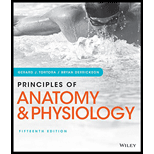
Principles of Anatomy and Physiology
15th Edition
ISBN: 9781119329398
Author: Gerard J Tortora, Bryan Derrickson
Publisher: John Wiley & Sons Inc
expand_more
expand_more
format_list_bulleted
Concept explainers
Question
Chapter 2, Problem 14CP
Summary Introduction
To review:
The functions performed by water in the human body.
Introduction:
The average amount of water present in an adult human body lies between 50-70% of total body weight. Water maintains the temperature of our body and performs different function in all the cells, organs, and tissues. Human body require water to perform various tasks like breathing, sweating, and digestion. It is important to rehydrate our body by drinking sufficient fluids.
Expert Solution & Answer
Want to see the full answer?
Check out a sample textbook solution
Students have asked these similar questions
Briefly state the physical meaning of the electrocapillary equation (Lippman equation).
Explain in a small summary how:
What genetic information can be obtained from a Punnet square? What genetic information cannot be determined from a Punnet square?
Why might a Punnet Square be beneficial to understanding genetics/inheritance?
In a small summary write down:
Chapter 2 Solutions
Principles of Anatomy and Physiology
Ch. 2 - List the names and chemical symbols of the 12 most...Ch. 2 - What are the atomic number, mass number, and...Ch. 2 - Define isotopes and free radicals.Ch. 2 - Which electron shell is the valence shell of an...Ch. 2 - Compare the properties of ionic, covalent, and...Ch. 2 - What information is conveyed when you write the...Ch. 2 - Checkpoint 7:
What is the relationship between...Ch. 2 - Compare potential energy and kinetic energy.Ch. 2 - Checkpoint 9:
How do catalysts affect activation...Ch. 2 - How are anabolism and catabolism related to...
Ch. 2 - Why are oxidation–reduction reactions important?Ch. 2 - Checkpoint 12:
How do inorganic compounds differ...Ch. 2 - Describe two ways to express the concentration of...Ch. 2 - Prob. 14CPCh. 2 - Checkpoint 15:
How do bicarbonate ions prevent...Ch. 2 - Prob. 16CPCh. 2 - Prob. 17CPCh. 2 - How are carbohydrates classified?Ch. 2 - Prob. 19CPCh. 2 - Prob. 20CPCh. 2 - Checkpoint 21:
Distinguish among saturated,...Ch. 2 - Define a protein. What is a peptide bond?Ch. 2 - What are the different levels of structural...Ch. 2 - Why are enzymes important?Ch. 2 - Checkpoint 25:
How do DNA and RNA differ?
Ch. 2 - Prob. 26CPCh. 2 - In the reaction catalysed by ATP synthase, what...Ch. 2 - CTQ 1: Your best friend has decided to begin...Ch. 2 - CTQ 2:
A 4-month-old baby is admitted to the...Ch. 2 - CTQ 3:
During chemistry lab, Maria places sucrose...
Knowledge Booster
Learn more about
Need a deep-dive on the concept behind this application? Look no further. Learn more about this topic, biology and related others by exploring similar questions and additional content below.Similar questions
- Not part of a graded assignment, from a past midtermarrow_forwardNoggin mutation: The mouse, one of the phenotypic consequences of Noggin mutationis mispatterning of the spinal cord, in the posterior region of the mouse embryo, suchthat in the hindlimb region the more ventral fates are lost, and the dorsal Pax3 domain isexpanded. (this experiment is not in the lectures).a. Hypothesis for why: What would be your hypothesis for why the ventral fatesare lost and dorsal fates expanded? Include in your answer the words notochord,BMP, SHH and either (or both of) surface ectoderm or lateral plate mesodermarrow_forwardNot part of a graded assignment, from a past midtermarrow_forward
- Explain in a flowcharts organazing the words down below: genetics Chromosomes Inheritance DNA & Genes Mutations Proteinsarrow_forwardplease helparrow_forwardWhat does the heavy dark line along collecting duct tell us about water reabsorption in this individual at this time? What does the heavy dark line along collecting duct tell us about ADH secretion in this individual at this time?arrow_forward
arrow_back_ios
SEE MORE QUESTIONS
arrow_forward_ios
Recommended textbooks for you
 Human Biology (MindTap Course List)BiologyISBN:9781305112100Author:Cecie Starr, Beverly McMillanPublisher:Cengage Learning
Human Biology (MindTap Course List)BiologyISBN:9781305112100Author:Cecie Starr, Beverly McMillanPublisher:Cengage Learning Human Physiology: From Cells to Systems (MindTap ...BiologyISBN:9781285866932Author:Lauralee SherwoodPublisher:Cengage Learning
Human Physiology: From Cells to Systems (MindTap ...BiologyISBN:9781285866932Author:Lauralee SherwoodPublisher:Cengage Learning Biology (MindTap Course List)BiologyISBN:9781337392938Author:Eldra Solomon, Charles Martin, Diana W. Martin, Linda R. BergPublisher:Cengage Learning
Biology (MindTap Course List)BiologyISBN:9781337392938Author:Eldra Solomon, Charles Martin, Diana W. Martin, Linda R. BergPublisher:Cengage Learning Principles Of Radiographic Imaging: An Art And A ...Health & NutritionISBN:9781337711067Author:Richard R. Carlton, Arlene M. Adler, Vesna BalacPublisher:Cengage Learning
Principles Of Radiographic Imaging: An Art And A ...Health & NutritionISBN:9781337711067Author:Richard R. Carlton, Arlene M. Adler, Vesna BalacPublisher:Cengage Learning Concepts of BiologyBiologyISBN:9781938168116Author:Samantha Fowler, Rebecca Roush, James WisePublisher:OpenStax College
Concepts of BiologyBiologyISBN:9781938168116Author:Samantha Fowler, Rebecca Roush, James WisePublisher:OpenStax College


Human Biology (MindTap Course List)
Biology
ISBN:9781305112100
Author:Cecie Starr, Beverly McMillan
Publisher:Cengage Learning

Human Physiology: From Cells to Systems (MindTap ...
Biology
ISBN:9781285866932
Author:Lauralee Sherwood
Publisher:Cengage Learning

Biology (MindTap Course List)
Biology
ISBN:9781337392938
Author:Eldra Solomon, Charles Martin, Diana W. Martin, Linda R. Berg
Publisher:Cengage Learning

Principles Of Radiographic Imaging: An Art And A ...
Health & Nutrition
ISBN:9781337711067
Author:Richard R. Carlton, Arlene M. Adler, Vesna Balac
Publisher:Cengage Learning

Concepts of Biology
Biology
ISBN:9781938168116
Author:Samantha Fowler, Rebecca Roush, James Wise
Publisher:OpenStax College